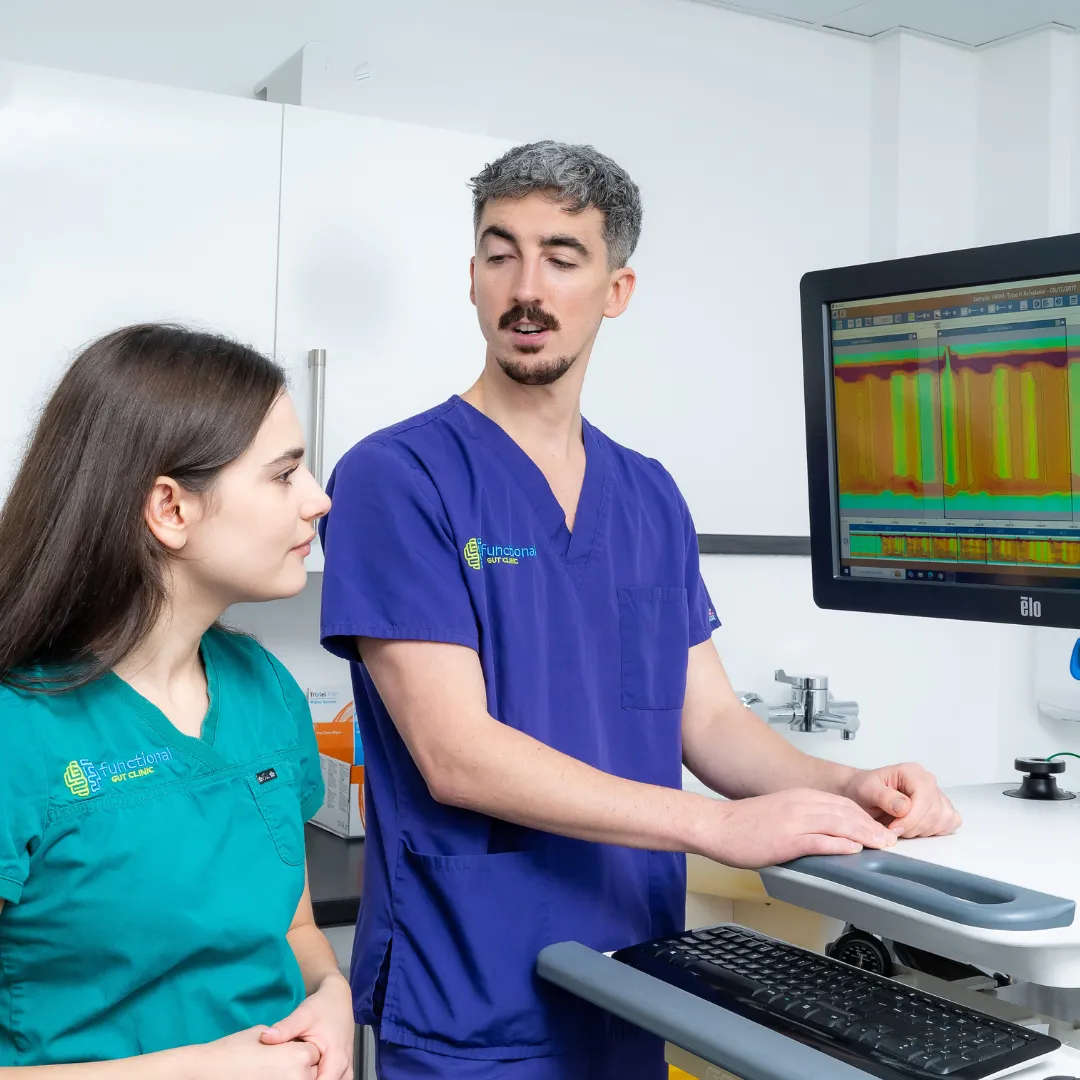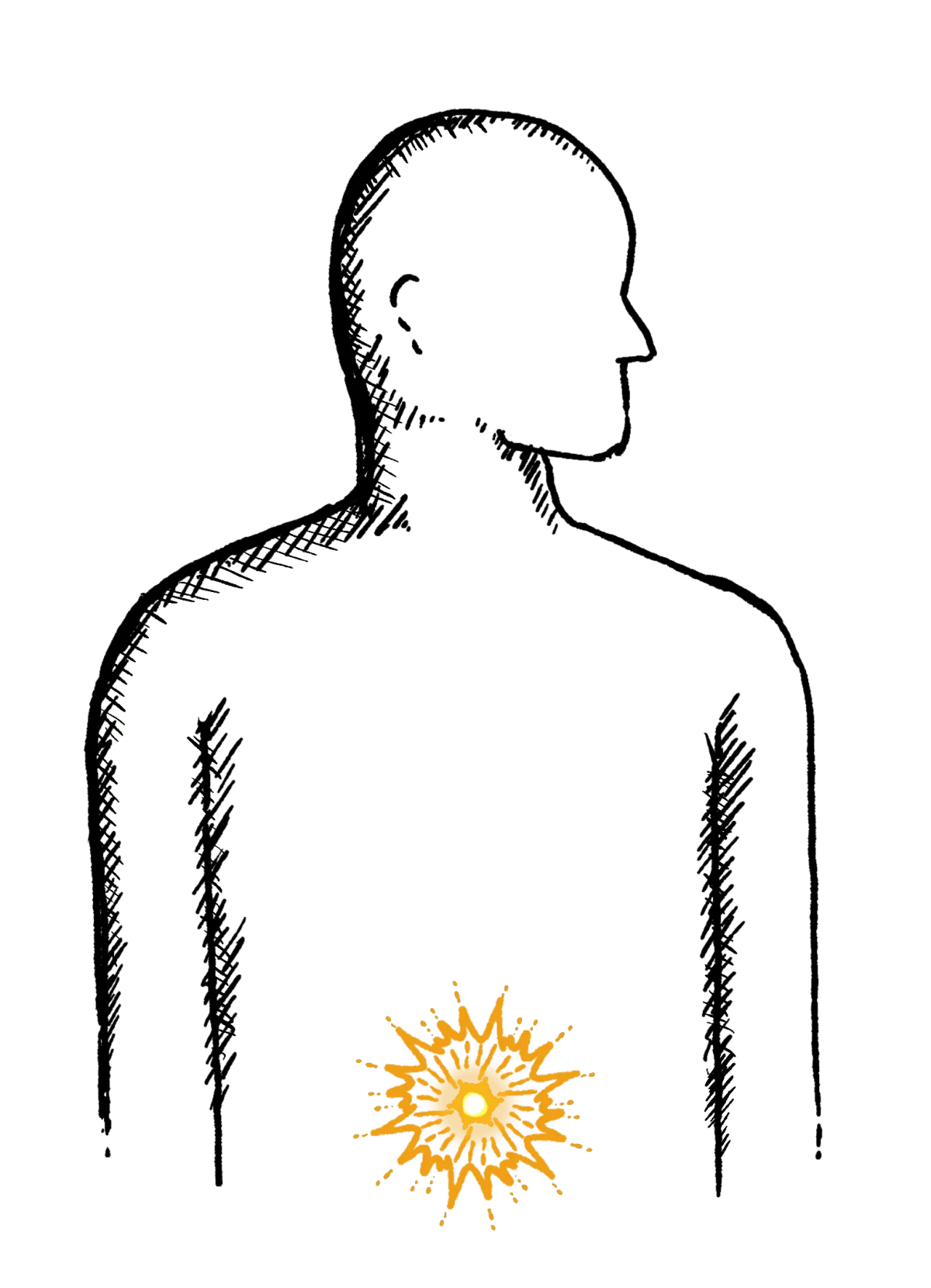Bloating
Struggling with bloating? Here’s what you need to know to find relief.
ALL TEST ARE ACCREDITED & REGULATED BY



What is bloating?
When you’re bloated, your stomach or abdomen can feel full and uncomfortable, or even painful.
This bloating happens when your gastrointestinal tract contains too much gas or air. Bloating can be mild, or more severe, and may present as:
– A visibly distended or swollen abdomen
– Feeling very full and uncomfortable
– Feeling of tightness in the abdomen
– Excess gas – belching and/or flatulence
– Rumbling or gurgling
There are several causes of bloating, so it’s important to diagnose the cause of your bloating and find out why it’s happening to you.

Why does bloating happen?
Prolonged periods of bloating could indicate an underlying health problem, if so you should see your GP.
Possible causes can include:
Irritable bowel syndrome (IBS diagnosis)
Ulcerative colitis, a form of inflammatory bowel disease (IBD), where the inner lining of the large bowel is inflamed and develops ulcers
Crohn’s disease, the other form of IBD, where some parts of your colon are inflamed
Too much bacteria in your small intestine (called small intestinal bacterial overgrowth, or SIBO)
Gastroesophageal reflux disease
Food intolerances, especially lactose or fructose intolerance
Producing too much gas (dysbiosis and fermentation)
Weight gain
Stress or anxiety
Delays in your food and drink moving on from your stomach (called gastroparesis)
Eating too quickly, so that you swallow too much air (called aerophagia)


Diagnosing bloating
Feeling bloated is no fun, but once you know what’s going on you can start to manage your symptoms and the underlying causes.
Testing options:
At the Functional Gut Clinic, we can run the following tests to diagnose the causes of bloating:
Gastric emptying test– which measures how quickly food leaves your stomach
Carbohydrate malabsorption breath test– which finds out if you have certain food intolerances (lactose or fructose)
Small intestinal bacterial overgrowth (SIBO) breath test– which finds out if you have an overgrowth of bacteria in your small intestine (called SIBO)
Oesophageal manometry– which measures the function of your oesophagus (food pipe)
24-hour pH impedance monitoring– which looks at whether you have any reflux
Colonic transit study-a non-invasive test which looks at how long it takes for faeces to pass through your bowl
Learn more about bloating

Home Remedies for Heartburn
There’s nothing worse than dealing with heartburn without your medication. Whether you reach for an antacid, proton pump inhibitor (PPI), or some other medication, you’re reliant on these treatments to avoid an uncomfortable few minutes or hours.
So, what can you do? Is there a home cure for heartburn? What’s the best heartburn treatment at home? And can lifestyle changes offer just as much of a remedy for heartburn? Let’s find out.
Home Remedies for Heartburn
You’re lying awake at night, struggling with heartburn. You reach for your antacids, but you’ve already taken the last one. Are there any other ways to get rid of heartburn?
Yes, there is. Heartburn is caused by acid reflux when acid from the stomach enters the food pipe (oesophagus). The pain comes from the acid’s irritation. If you can neutralise or stop the acid, you can relieve your symptoms.
So, what kitchen cupboard cures for heartburn exist? Here are some effective solutions:
Baking soda. The most obvious solution – baking soda or bicarbonate of soda is a natural alkaline. It will rapidly neutralise the acid, reducing heartburn almost immediately.
Water. Drinking a big glass of water can help dilute the acid, alleviating symptoms.
Apple cider vinegar. Some argue that it can relieve reflux symptoms – however, it’s not had rigorous scientific testing.
Honey. Preliminary studies confirm that honey can relieve the physical effects of GERD.
Chewing gum. Chewing triggers the release of saliva that can neutralise your stomach acid. Chewing gum for 30 minutes after a meal can lower acid levels.
Aloe vera juice. Renowned for its soothing properties, drinking aloe vera is believed to reduce stomach acid and calm irritation.
Ginger tea. Ginger is known for its anti-inflammatory properties and can help soothe the stomach. Drinking ginger tea can help calm the stomach and reduce the acid that causes heartburn.
Almonds. Eating a few almonds after meals can help absorb stomach acid and relieve symptoms of heartburn. Almonds are alkaline-forming, which means they could help neutralise stomach acid.
Bananas. Bananas have a natural antacid effect. Eating a banana can coat your oesophagus and help counteract the acid causing your heartburn, providing soothing relief.
There’s one ingredient you want to stay away from: peppermint. Despite the fact that peppermint can relax your intestines, it’s known to increase acid reflux symptoms in some people. The reason? Well, it loosens up the lower oesophageal sphincter (LOS), allowing your stomach contents to flow backwards more easily.
Heartburn Treatment at Home
The simplest cure for heartburn is to avoid your triggers. Several dietary and lifestyle changes can minimise acid production, limit LOS relaxation, and prevent reflux.
Food and Diet
Your diet is one of the main reasons for acid reflux. Certain foods can relax your LOS and cause acid production. These include: Tomatoes and tomato-based products (e.g., pasta sauce, ketchup)
Citrus fruits (oranges, lemons, limes, grapefruits)
Spicy foods (chilli peppers, hot sauce, curries)
Vinegar-based foods (pickles, salad dressings)
Deep-fried foods (fries, fried chicken, doughnuts)
Fast food (burgers, pizza, tacos)
Full-fat dairy (cheese, whole milk, butter, cream)
Fatty cuts of meat (pork belly, bacon, sausages)
Chocolate and cocoa-based products
Caffeinated drinks (coffee, tea, energy drinks)
Carbonated drinks (soda, sparkling water)
Alcohol (wine, beer, spirits)
Peppermint and spearmint
Onions and garlic
Processed snacks (chips, biscuits, pastries) In addition to these foods, eating large meals just before bed can trigger a severe acidity attack. Be smarter. Rather than reaching for your remedies for heartburn, limit your food intake right before bed. Eat fewer, smaller meals throughout the day to prevent excess pressure in your stomach.
Lifestyle Changes
Lifestyle factors can exacerbate your reflux episodes. These include:
Stress
Smoking
Alcohol consumption
Tight clothing
Lying flat while sleeping
Addressing these issues won’t provide immediate relief during an acidity attack. However, in the long-term, it will reduce the prevalence of these attacks – more management strategy than a cure for heartburn.
Getting Tested for Acid Reflux
Tried any of these remedies for heartburn? If you’re experiencing frequent GERD flare-ups, you might have a bigger issue. Here at The Functional Gut Clinic, we can help diagnose GERD and identify the potential underlying cause behind your reflux.
We offer both 24-hour reflux testing and oesophageal manometry. Speak to our team for further details. We’ll provide a thorough explanation of our findings, recommending the best course of action. Contact us today to learn more.
Hear from people we’ve helped, just like you.
"Very professional while welcoming and friendly"
"The manner and demeanour of all staff from reception to people carrying out the test was very professional but welcoming and friendly. Atmosphere is very relaxed and all instructions clear and concise."
London Patient

"Highly recommend this"
"Thanks to Dr Hobson and everyone at the Functional Gut Clinic. The whole team is very kind and generous and they are doing things that are cutting edge and they actually get results."
Manchester Patient

"Highly recommend this"
"After stopping my lansoprazole, every time I had a warm drink, I could feel it burn all the way down to my stomach. Thank you to Sam for making me feel at ease." - Manchester Patient

"My experience could not be better"
"Pleasant and knowledgeable staff that made the experience more enjoyable than it should be!" - London Patient

"Very friendly and knowledgeable"
"An excellent service from beginning to end. I would recommend to anyone who was considering having testing done. Very friendly and knowledgeable!" - Manchester Patient

"Very kind and helpful"
"It was also great to have time to talk to the clinicians – very important when you have problems. Reception staff also very kind and helpful." - Manchester Patient

Are you experiencing any other symptoms
Symptoms are often closely connected. Find out more below.
Reflux

Burning mid-chest, worse when bending or lying down
Constipation

Difficulty going to the toilet, unusual stools, often with stomach ache or intestinal cramps, bloating, nausea or appetite loss
Heartburn

A burning pain in your chest, just behind your breastbone.
The pain is often worse after eating...
Regurgitation

Bringing food or drink back up, difficulty swallowing, feeling that food or drink is stuck in your throat, horrible taste in your mouth
Swallowing Issues

Dysphagia - difficulty swallowing, feeling that food or drink is stuck in your throat, horrible taste in your mouth
Diarrhoea

Loose or explosive stools, can’t get to a toilet in time
Abdominal Pain

Cramps; sharp or dull pain, Bloating, Excessive belching, Nausea or vomiting
Faecal Incontinence

Stools leak unexpectedly, Can’t get to a toilet in time
IBS

Abdominal pain or cramping, bloating, changes in bowel habits and urgency, gas

